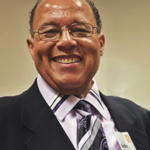
U.S. Supreme Court Decision on Race – Podcast Episode 18 | Podcast Episode 18
Podcast: Play in new window | Download
Classnotes Podcast (August 15, 2007) The U.S. Supreme Court issued a ruling in late June involving race desegregation in two school districts in Seattle and Louisville. The cases involved specific methods used for voluntary integration of schools, which were stricken down by the court’s ruling, causing schools across the country to wonder whether they must drastically change their own desegregation efforts. Bradley Scott, Ph.D., director of the IDRA South Central Collaborative for Equity, clarifies the issue that the ruling applies only to voluntary desegregation plans and that race can sometimes be used to achieve diversity for the benefit of children’s effective education. Bradley is interviewed by Christie Goodman, APR, IDRA’s communications manager.
Send comments to podcast@idra.org
Sign up for Classnotes e-mail alerts.
Show length: 20:39
Supreme Court Decisions in the Louisville and Seattle Cases
The Seattle and Louisville Voluntary Integration Cases – A Primer
Talking Points on the Louisville / Seattle Resegregation Cases
Fulfilling the Promise of Brown and Mendez
Multi-racial community dialogs to improve education
Intercultural Development Research Association
Office for Civil Rights, U.S. Department of Education
Goals of Desegregation
South Central Collaborative for Equity
Six Goals of Education Equity
IDRA South Central Collaborative for Equity
Your feedack
We welcome your comments and questions to the podcast. Please send an e-mail to podcast@idra.org.
Listen to every episode!
To ensure you don’t miss a single episode of IDRA Classnotes, subscribe to the podcast in iTunes, (download iTunes free if you don’t have it) or sign up to receive an e-mail alert as soon as a new show is published.


